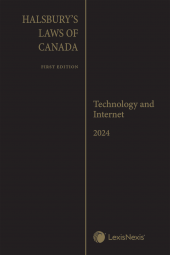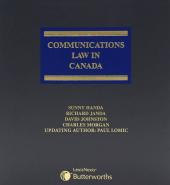Electronic Evidence and E-Discovery
One Year Subscription Only Terms
Subscribers receive the product(s) listed on the Order Form and any Updates made available during the annual subscription period. Shipping and handling fees are not included in the annual price.
Subscribers are advised of the number of Updates that were made to the particular publication the prior year. The number of Updates may vary due to developments in the law and other publishing issues, but subscribers may use this as a rough estimate of future shipments. Subscribers may call Customer Support at 800-833-9844 for additional information.
Subscribers may cancel this subscription by: calling Customer Support at 800-833-9844; emailing customer.support@lexisnexis.com; or returning the invoice marked 'CANCEL'.
If subscribers cancel within 30 days after the product is ordered or received and return the product at their expense, then they will receive a full credit of the price for the annual subscription.
If subscribers cancel between 31 and 60 days after the invoice date and return the product at their expense, then they will receive a 5/6th credit of the price for the annual subscription. No credit will be given for cancellations more than 60 days after the invoice date. To receive any credit, subscriber must return all product(s) shipped during the year at their expense within the applicable cancellation period listed above.
Détails des produits
Are You Prepared for Litigation Involving Electronic Information?
Virtually every case today, from small claims to class actions, involves electronic information: emails, word-processing documents, spreadsheets and databases, metadata, digital photographs, and many other media. Electronic information can make or break a legal cause of action or a defence-or lead to a quick settlement.
Issues that did not exist a decade ago now play a major role in deciding the outcome of litigation:
- What constitutes electronic evidence?
- When do you need to retain it?
- When are you obligated to disclose it?
- How is it gathered?
- How do you use-or challenge-it in court?
Electronic Evidence and E-Discovery is an essential evidence law resource for anyone who participates in civil litigation or electronic information management. Discover how traditional methods have changed to keep pace with technological advancements-and make sure your clients or organization are not exposed to unnecessary risk.
Features and Benefits
- Discussion of preventative measures to help you manage risk before litigation arises
- Electronic discovery strategy recommendations for disclosing and obtaining discovery of electronic evidence-and how to obtain e-discovery from non-parties
- Sources of electronic evidence to ensure you protect, retain, and search all relevant media
- Step-by-step explanation of how computer forensics can work to your advantage in litigation
- Checklist of key steps and issues in creating a document management policy
- E-Discovery checklist for effectively gathering and preserving electronic evidence during the discovery or disclosure process
Essential Risk Management Advice For
- Civil litigators who need to know how to gather and present electronic information to support a case
- Corporate counsel who strive to balance the costs of retaining and gathering electronic information against the need to succeed in litigation
- Crown counsel who are obligated to disclose all documents in a case
- Business executives and IT managers who are responsible for designing and implementing policies, systems, and procedures for managing electronic information
Table des matières
Chapter 1: Introduction to Electronic Evidence and Electronic Discovery
Chapter 2: Managing Electronic Evidence Risks before Litigation: Document Management Policies
Chapter 3: Electronic Discovery: the Obligation to Preserve and Disclose Electronic Evidence
Chapter 4: Gathering and Preserving Electronic Evidence
Chapter 5: Using and Challenging Electronic Evidence Effectively
 Lexis Nexis
Lexis Nexis 


